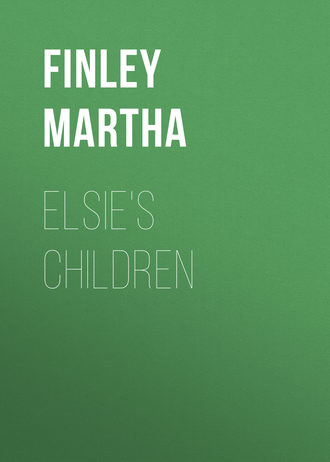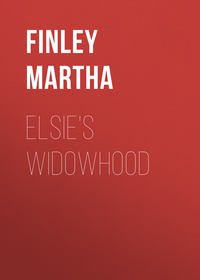 полная версия
полная версияElsie's children
From New York they passed up the Hudson in a steamboat; the carriage from the Crags was found in waiting at the landing, and a short drive brought them to the house, which stood high up above the river, in the midst of magnificent mountain scenery.
The Ion children, taught from early infancy to notice the beauties of nature, were in ecstasies of delight, exclaiming anew at every turn in the road, calling each other's, mamma's or grandpa's attention to the sparkling river, the changing shadows on the mountainsides, here a beetling crag, there a waterfall or secluded glen. Having rested the previous night, sleeping soundly at a hotel, they were not wearied with travel but seemed fresher now than when they left their home.
Lucy and her little flock, gathered on the front porch to receive their guests, gave them a warm welcome. The two ladies had lost none of the affection for each other which had been one of the happinesses of their childhood and early youth, and each loved the children of the other for the mother's sake if not for their own. They numbered the same, but Sophie, Lucy's youngest, was now in her fifth year, and Baby Lily was greeted with many expressions and demonstrations of delight.
Lucy excused her husband's absence: he was away on business, she said, but would be at home before night.
"Where's Phil?" asked Eddie, turning to Gertrude.
"Oh, he's at boarding-school, don't you know?" she answered. "He'll be home in vacation; but that doesn't begin for two weeks yet."
Mr. Dinsmore tarried for a few days, then returned to the neighborhood of Philadelphia, where he had left his wife and Rosie, who were visiting their northern relatives.
Miss Fisk was still governess at the Crags, and when the children had had a week of play together, it was thought best by the mammas, that two hours of each morning should be devoted to lessons.
Knowing Miss Fisk to be not only well educated and refined, but also a conscientious and good woman, Elsie was willing to entrust her children to her care; the more so, because Lily in her feeble state, required much of her own time and attention.
In the midst of a beautiful grove of oaks and maples, on the side of a hill, scarce more than a stone's throw from the mansion, and within full view of its windows, stood a small brick building owned by Mr. Ross, and used as a summer schoolroom for the children.
It was a cool shady spot, enlivened by the songs of the wild birds who built their nests in the trees, and the musical tinkle of a little waterfall that came tumbling down from the heights above not half-a-dozen yards from the door.
Mr. Ross had furnished the room with comfortable and convenient chairs and desks, and Lucy had made it pretty and tasteful with white muslin curtains and neatly papered walls of a soft neutral tint, enlivened by a few gayly colored pictures. Woodwork and floor were stained a rich dark brown, bright soft rugs were scattered here and there; and altogether the place was as inviting as a lady's parlor.
The Ion children were well content to spend here two or three hours of that part of the day when the sun was too hot for them to be exposed to his rays with safety and comfort: the others found lessons made much more agreeable by the companionship of their young guests, and Miss Fisk was glad to take them under her charge, because by their intelligence they added greatly to the interest of her work, while their respectful obedient behavior exerted an excellent influence upon her other pupils.
Before leaving home, Elsie, after careful and prayerful consideration, thought it best to have a plain talk with her older children about the temptations that were likely to assail them during their visit to the Crags.
They had had some past experience of the ways of Lucy's children, and she knew they had not forgotten it; and reminding them of the Bible declaration, that "evil communications corrupt good manners," she bade them, while refraining as far as possible from judging their little friends, at the same time to carefully avoid following their example in anything they knew to be wrong.
"Mamma," said Vi, "perhaps sometimes we mightn't know if it was wrong!"
"I think you will, daughter, if you take a moment to think; and if you are doubtful, you may be pretty sure it is wrong."
"Mamma, we mustn't tell tales to you?"
"No, dear; but perhaps you can consult me without that; and do not forget that you can always lift up your heart to God for help to know and do the right."
"Yes, mamma," returned the little girl thoughtfully, "and I do believe Elsie will 'most always be there and know what's right."
"I'm not sure," said her sister, with a grave shake of the head, "I wish we could always have mamma by to tell us."
"But mamma cannot be with you always, darlings," Elsie said, regarding them with yearning tenderness, "and so, as your papa and I have often told you, you must learn to think and decide for yourselves; about some things now, and about others as you grow older and wiser. Some things the Bible tells us plainly, and in regard to those we have nothing to do but obey."
CHAPTER FOURTH
"A child left to himself bringeth his mother to shame."
– PROVERBS xxix. 15.Lucy, too, had a talk with her children, in which she begged them quite pathetically, not to disgrace her before the expected guests, Mr. Dinsmore especially, who was so very strict in his ideas of how children ought to be brought up, and how they should behave.
They promised readily enough to "behave splendidly" and for a few days did so astonishingly well that, as she laughingly said, "she began to grow frightened lest they were becoming too good to live."
But she need not have been alarmed; the reaction was not long in coming and was sufficient to relieve all apprehension that they were in immediate danger from an overplus of goodness.
It began on the morning after Mr. Dinsmore's departure. Gertrude was late to breakfast, and when reproved by her mother answered in a manner so disrespectful as to quite astonish the young Travillas. They expected to see her banished at once from the table and the room; but her mother only looked grave and said in a tone of displeasure, "Gertrude, I cannot have you speak to me in that way – Don't do it again."
"I don't care; you needn't scold so about every little trifle then," muttered the delinquent in an undertone, pulling the dish of meat toward her, helping herself and spilling the gravy on the clean tablecloth.
Mrs. Ross did not seem to hear, she was spreading a piece of bread with the sweetest and freshest of butter, for Sophie.
"I don't want it, I want waffles!" screamed the child, snatching up the bread the instant it was laid on her plate, and dashing it on to the carpet.
"You are not well this morning, dear, and mamma thinks waffles might make her darling worse," said Lucy in a soothing tone. "Come now be a good baby, and eat the bread. Shall mamma spread another piece?"
"No, no, naughty mamma! I'll jus' frow it on the floor if you do," cried the child, bursting into angry sobs.
"Shall mamma have some toast made for her?" (coaxingly).
"No, no! waffles! and butter on waffles, and 'lasses on butter, and sugar on 'lasses!"
The mother laughed. It seemed to irritate the child still further; and she screamed louder than ever, slid down from her chair and stamped her foot with rage.
Mrs. Ross was deeply mortified at the exhibition. "Pick her up and carry her to the nursery," she said to a servant.
Sophie kicked and struggled, but the girl, – a strong and determined one – carried her away by main force.
"I'm dreadfully ashamed of her, Elsie," Lucy said, turning to her friend; "but she's a nervous little creature and we must try to excuse her."
"A few hearty slaps would reverse the nervous currents and do her an immense amount of good, Mrs. Ross," remarked the governess in her slow, precise way.
"Slaps, Miss Fisk," returned Lucy reddening, "I don't approve of corporal punishment, as I have told you more than once. I was never whipped, and I don't intend that any of my children shall be."
"Most assuredly not, madam; but I was recommending it not as a punishment for disobedience or ill temper, but simply as a remedial agent. I have never experienced anything of the kind myself, Mrs. Ross, but have heard it remarked that nervousness occasions greater suffering than what is generally understood by the term pain; therefore I suggested it as I should the amputation of a diseased member when necessary in order to preserve life."
"Permit me to remark," returned Lucy, "that unmasked advice is seldom acceptable, and now a truce to discussion, if you please. My dear Elsie," turning to Mrs. Travilla, "I beg you to excuse our ill-manners. It strikes me that none of us are behaving quite as we ought this morning. Hal and Archie, what's wrong between you now?" For the two boys, seated side by side, were scowling at each other, and muttering angrily half under their breath.
"Why, ma, he went and took the very piece of meat I just said I was going to have," whimpered Archie, digging his fists into his eyes.
"Well, I don't care," retorted Harry, "I'd as good a right as you, and I was ready first."
"Give him a part of it, can't you?" said his mother.
"'Tain't more'n I want myself."
"I won't have it after it's been on his plate," exclaimed both together.
"Boys, I'm ashamed of you!" said Lucy, "I wish your father were here to keep you straight. You don't dare behave so before him. I'm sure your little friends would never act so. Don't you see how your naughtiness astonishes them? Vi, would you talk to your mamma as my children do to me?"
The large blue eyes opened wide upon the questioner in half incredulous, reproachful surprise, then turned upon the beautiful, gentle face of Mrs. Travilla with an expression of ardent affection mingled with admiration and respect. "O Aunt Lucy! could you b'lieve I'd do that to my mamma?"
The very thought of so wounding that tender mother heart was evidently so full of pain to the little one, that Elsie could not refrain from responding to the appeal, "Mamma knows you would not, darling."
"Oh, no, mamma, 'cause I love you!" cried the child, the young face growing bright with smiles.
"Atmospheric influences have often a great deal to do with these things; do you not find it so?" Elsie said, turning to her friend.
"Yes, I have noticed that!" Lucy said, catching gladly at the suggestion: "and the air is certainly unusually oppressive this morning. I feel nervous myself. I think we'll have a gust before night."
The last words were spoken in an undertone, but the quick ear of Gertrude caught them. "Then I shan't go to school," she announced decidedly.
"Nonsense," said her mother, "'twon't be here till afternoon; probably not till night, if at all."
"Now, ma, you're just saying that. Aunt Elsie, do you really think it won't come soon?"
Glancing through the open window at the mountains and the sky, Elsie answered that she saw no present indications of a storm; there was nothing to betoken it but the heat and closeness of the air.
"Are you afraid of thunder, Aunt Elsie?" asked Harry.
"Lightning, you silly boy," corrected Gertrude, "nobody's afraid of thunder."
"Yes, you are," he retorted. "You just ought to see, Ed, how scared she gets," and Harry laughed scornfully.
Gertrude was ready with an indignant retort, but her mother stopped her. "If you are really brave, Gertrude, you can have an excellent opportunity to show it when the storm comes." Then to Harry, "Let your sister alone, or I'll send you from the room."
The gust, a very severe one, came in the afternoon. Before it was fairly upon them, Lucy, herself pale with terror, had collected her children in a darkened room and seated them all on a feather-bed, where they remained during the storm, half stifled by the heat, the little ones clinging to their mother, hiding their heads in her lap and crying with fear.
Elsie and her children formed a different group; the mother the central figure here also, her darlings gathered closely about her, in her dressing-room – at a safe distance from the open windows – watching with awed delight, the bursting of the storm clouds over the mountain-tops, the play of the lightning, the sweep of the rain down from the heights into the valleys and river below, listening to the crash and roar of the thunder as it reverberated among the hills, one echo taking it up after another, and repeating it to the next, till it sounded like the explosions of many batteries of heavy artillery, now near at hand, now farther and farther away.
"Mamma, isn't it grand?" exclaimed Eddie, in one of the brief pauses in the wild uproar of the elements.
"Yes," she said, "the thunder of his power who can understand?"
"Is it God, mamma? does God make it?" asked little Herbert.
"Yes, dear; 'when he uttereth his voice, there is a multitude of waters in the heavens, and he causeth the vapors to ascend from the ends of the earth; he maketh lightnings with rain, and bringeth forth the wind out of his treasuries.'"
"We needn't be 'f'aid, mamma?"
"No, darling, no; for God is our Father; He loves us and will take care of us."
The storm was very violent while it lasted, but soon passed away; the sun shone out, and a beautiful rainbow spanned the eastern sky above the mountain-tops.
Elsie's children clapped their hands in ecstasy, and ran to call their little friends to enjoy the sight with them. Mrs. Ross followed, looking so pale and exhausted, that Elsie inquired with concern if she were ill.
"Oh, it was the storm!" she said, "wasn't it fearful? I was sure the house would be struck and some of us killed. Weren't you frightened?"
"No," Elsie said, with a kindly reassuring smile, "I presume my nerves are stronger than yours, and I am not naturally timid in regard to thunder and lightning. Besides, I know so well that he who guides and controls it is my Father and my Friend. Come, look at his bow of promise."
The children were in a group about the window, gazing and admiring.
"Let's ask mamma for the story of it," Vi was saying.
"The story of it?" repeated Archie Ross.
"Yes; don't you know? about Noah and the flood."
"I never heard it."
"Oh, Archie, it's in the Bible; grandma told it to us once," exclaimed his sister Gertrude.
"I didn't hear it, anyhow," persisted the boy, "do, Vi, coax Aunt Elsie to tell it."
The petition was readily granted. Mrs. Travilla was an inimitable story-teller, and Lucy, whose knowledge of Scripture history was but superficial, listened to the narrative with almost as much interest and pleasure as did the children.
"I would give anything for your talent for story-telling, Elsie," she said at its conclusion.
"Oh, another! another! Please tell us another?" cried a chorus of young voices.
Mrs. Travilla drew out her watch, and holding it up with a smile, "Not just now, my dears," she said, "see it is almost tea-time, and," she added playfully, "some of us have need to change our dresses and smooth our tangled tresses."
"That is true," said Lucy, rising hastily, "and I expect my husband home. I must send the carriage off at once to the depot; for the train is nearly due."
Thereupon a cry was raised among the Rosses as they flew after their mother, "I want to go for papa!" "and I!" "It's my turn, I say, and I will go!" "No, you shan't, for it's mine."
CHAPTER FIFTH
"She fed me first to God;
Her words and prayers were my young spirit's dew."
– PIERPONT."Hallo! this looks like welcome; every one of you been crying!" Mr. Ross said, catching up Sophie in his arms, and glancing about upon his group of children, after an affectionate greeting to his wife, and a cordially kind one to their guest.
"What's the trouble? so sorry papa was coming home, eh?"
"No, no, that wasn't it, papa," they cried, crowding around him, each eager to claim the first caress, "it wasn't that, but we wanted to go for you, and mamma wouldn't let us."
"Yes," said Lucy, "they all wanted to go and as that couldn't be, and no one would give up to the others, I kept them all at home."
"Quite right," he said, gravely, "I'm afraid you hardly deserve the pretty gifts I have brought."
"Oh, yes, yes, papa, we'll be good next time! Indeed we will! Mamma, coax him!"
"Yes, do let them have them, Phil," urged his wife, "where would be the use of keeping the things back after spending your money for them?"
"To teach them a good lesson. I'm afraid both you and I are foolishly indulgent, Lucy."
"Oh, they'll be good next time."
"This once then, but only this once, unless they keep their word," he said, producing his gifts – a book or toy for each of his own children, and a package of sweetmeats which he divided among all present.
He had brought a new dog home with him, but no one but Eddie had noticed it yet. He was stroking and patting it, saying, "Poor fellow, what kind of a dog are you?"
"A French poodle," said Mr. Ross, coming up to them, "A good watch dog, and excellent for scaring up the wild ducks for the sportsmen. Do you and papa keep up the shooting lessons, master Eddie?"
"Yes, sir; papa has always said he meant to make me as good a shot as himself, and mamma says it was never his way to give up till a thing's thoroughly done," returned the boy, proudly.
"And you don't equal him as a shot yet, eh?"
"No, sir! no, indeed! Why, even cousin Cal Conly – a big man – can't shoot as well as papa."
"What an ugly dog!" exclaimed the other children, gathering round.
"What did you buy it for, papa?" asked Gertrude.
"Not for beauty, certainly," laughed Mr. Ross, stroking and patting the shaggy head of the dog, who was covered with curly hair of a dirty white, mottled with dull brown, "but for worth which is far better. Isn't it, Ranger?"
A wag of his bushy tail, was Ranger's only reply.
"Will he bite?" asked little Herbert, shrinking back as the newcomer turned toward him.
"Tramps and burglars; but not good children," replied Mr. Ross. "You needn't be afraid of him, my little man."
Through the evening there was a great deal of romping between the children and the new dog, but little Elsie seemed unusually quiet, scarcely stirring from her mother's side. She was suffering with toothache, but kept her trouble to herself; principally, because she had a great dread of the dentist's instruments.
But in the night the pain grew so severe that she could not keep from crying and groaning. She did not want to wake any one, so buried her face in the pillow to smother the sound of her sobs; but presently a gentle hand touched her caressingly, and mamma's sweet voice asked, "What ails my little daughter?"
"O mamma I did not mean to wake you!" cried the little girl sitting up with her hand pressed to her cheek, "but the pain was so bad I couldn't help making a noise."
"My poor dear little girl! did you think your mother would want to sleep when her child was in pain?" Elsie said, clasping her in her arms. "No, indeed! so do not try to bear any pain alone another time."
Mamma's loving sympathy was very sweet; the pain was soon relieved, too, by some medicine she put into the tooth, and presently all was forgotten in sound refreshing sleep.
Elsie came into her mamma's dressing-room the next morning, along with the others, looking as bright and well as was her wont, yet with the boding fear that something would be said to her about having the troublesome tooth extracted.
However to her relief the subject was not broached at all; they had their usual reading and prayer, recitation of texts and talk with mamma about the lessons contained in them, and then the breakfast bell summoned them to their morning meal.
The tooth was quiet for a few days, then ached again for several hours harder than ever.
"O mamma, mamma, what shall I do?" sobbed the child in the midst of her pain.
"Couldn't my little girl pluck up courage enough to have it out?" asked the mother tenderly.
"O mamma, don't say I must! please don't; I'm so frightened at the very thought!"
"Ah, if I could only bear it for you, my darling! but you know I cannot."
"No, dear mamma, and I couldn't be so selfish as to let you, if you could. But must I have it out?"
"I have not said so; I should far rather my dear daughter would say must to herself."
"Ought I, mamma?"
"Ought you not? The tooth has become only a source of pain and trouble to you; if left it will cause the others to decay, and decayed teeth injure the health. Health is one of God's best gifts and it is our duty to use every means in our power to preserve it."
"Yes, mamma, but oh, I'm so afraid!" cried the child, trembling and weeping.
"My darling, resolve to do your duty with God's help, and he will fulfill his promise to you. 'As thy days so shall thy strength be.'"
Little Elsie had long ago given her heart to Jesus; love to him was the ruling motive of her life, and to please and honor him she was ready to do or endure anything. "I will try, mamma," she said, "and you too will ask God to help me?"
Mamma gave the promise, sealing it with a very tender kiss.
Mr. Ross was going down to New York the next morning, and it was soon arranged that his wife, Mrs. Travilla and little Elsie, should accompany him.
Mrs. Ross had some shopping to do, but would first take the two Elsies to her dentist, so that the little girl's trial might be over as soon as possible and she able to enjoy some sight-seeing afterward. Baby Lily was better and could be safely entrusted for the day to Aunt Chloe's faithful care.
The plan was concealed from the Ross children because, as their mother said, "it was the only way to have any peace." So they were allowed to sleep until the travelers had taken an early breakfast and gone.
The little Travillas, however, were up and saw the departure, bidding a cheerful good-bye to "mamma and sister Elsie," sending wistful, longing looks after the carriage as it rolled away, but making no complaint that they were left behind.
"Poor dear Elsie!" Vi said with tears in her eyes, "it's just dreadful that she must have that tooth extricated."
"Extracted," corrected Eddie. "Vi, you seem to forget what mamma says: – that you should never use a big word unless you are sure you have it right; or when a little one would do as well."
"What little one?"
"Pulled."
"Couldn't it be pulled and not come out?"
"Well then you might say pulled out."
"I like the other word best," persisted Vi. "But we needn't be particular about words when Elsie's going to be so dreadfully hurt."
Herbert burst out crying at that.
"Why Herbie what ails you?" asked Vi, putting her arms round his neck and giving him a kiss.
"I don't want the mans to hurt my Elsie," sobbed the little fellow, "maybe dey'll kill her."
"Oh, no, they won't! mamma will never let them do that. They'll only take away the naughty tooth that hurts her so."
"Come let's go and walk round the garden," said Eddie, taking Herbie's hand, "mamma said we might."
The breakfast bell called them in to find the Rosses making a perfect bedlam in their anger and disappointment at being left behind by their parents. Sophie was screaming and stamping with rage, the boys and Kate were whimpering and scolding, and Gertrude walking about with flashing eyes, was saying "I'll never forgive mamma for this, no I never will; for she'd promised to take me along next time she went to the city."
Violet, Eddie, and Harold hearing these words, looked at each other in horrified silence. "How could she speak so of her own mother?"
Miss Fisk came in, in her quiet, deliberate way and stood looking for a moment from one to another of her pupils in a sort of amazed, reproving silence that presently had the effect of quieting them down a little. Then she spoke.
"Young ladies and young gentlemen, I am astonished! especially at your expressions and behavior, Miss Gertrude Ross. How you can permit yourself to indulge in such invectives against parents so extremely indulgent as Mr. and Mrs. Ross, I cannot conceive."
Sophie whose screams had sunk to sobs, now permitted the servant to lift her to her high chair, Kate and the boys slunk shamefacedly into their seats at the table, and Gertrude, muttering something about "people not keeping their promises," followed their example.









